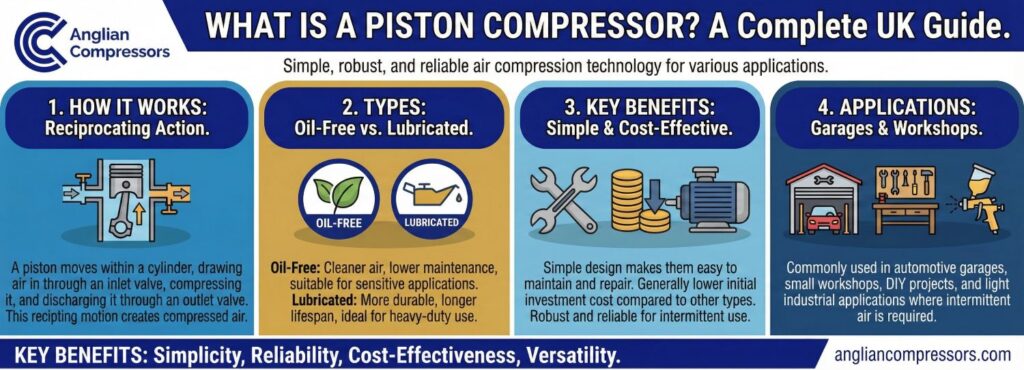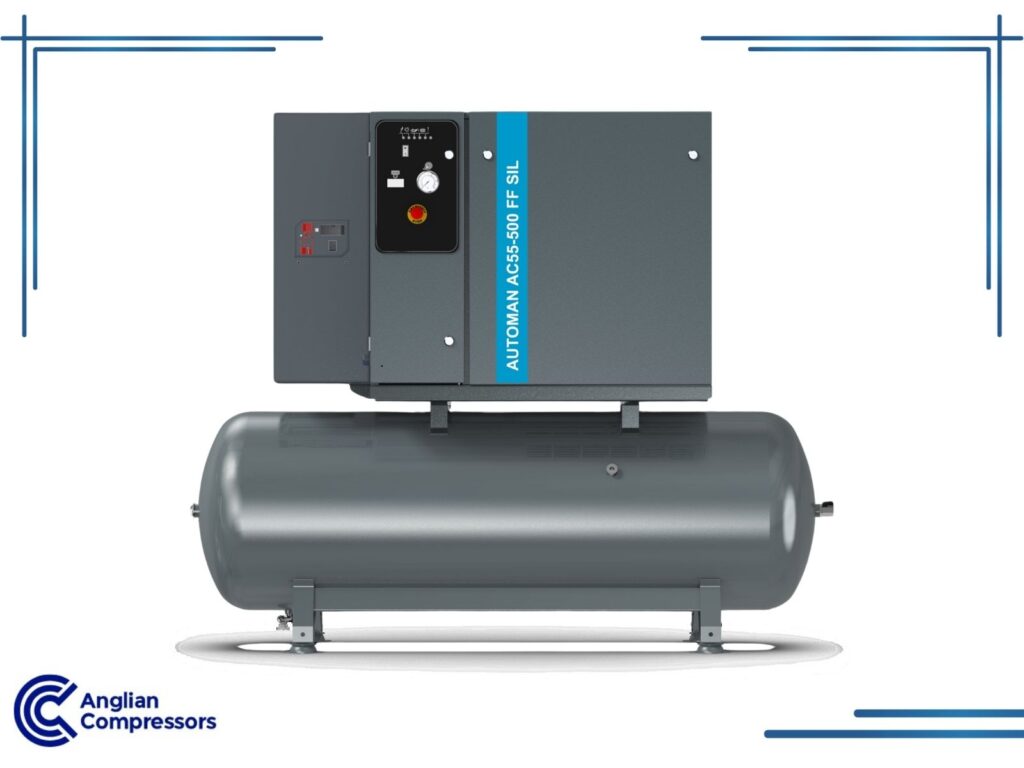What is a Piston Compressor?
Piston compressors, also frequently referred to as reciprocating compressors, have been one of the most popular types of air compressors since the 18th century. A piston compressor is a type of positive displacement compressor, which means it works by trapping ambient air in a chamber and reducing the chamber’s volume to increase the air pressure. While the working principle of piston compressors still relies on the same reciprocating principle today as it did centuries ago, modern versions are relatively quiet, durable, and versatile compared to their predecessors.
Nevertheless, there are many specific types of piston compressors to choose from, meaning it is essential to understand the ins and outs of each one, so that you can invest wisely into the most suitable equipment for your environment and application. This guide will help you understand the different types of piston compressors and their unique features.
Here at Anglian Compressors, a Branch of Atlas Copco Compressors, we have been installing, servicing, and repairing all types of air compressors for businesses in the UK for almost 50 years. Not only are we a premier distributor for the esteemed manufacturer Atlas Copco, but we are also experts in maximising workplace productivity, which is why we thoroughly inspect your site to recommend the most reliable and energy-efficient solutions available, whether you need air compressors, dryers, gas generators, filters, or a combination of the above.
Below, we explain how piston compressors work before introducing the available types. We also discuss the most common applications for reciprocating compressors and their pros and cons to help you purchase the most suitable appliance for your workplace. Do not hesitate to give us a call if you have any questions.
How Piston Compressors Work
Piston air compressors operate using the principle of positive displacement, which means that they increase the pressure of the air by reducing its volume. The main components of these air compressors are valves and a piston that moves back and forth inside a cylinder using a reciprocating motion driven by a crankshaft.
As the piston moves downward, it draws air into the cylinder through the inlet valve. When the piston moves back up inside the cylinder, the inlet valve closes, forcing the air inside the cylinder to compress. The compressed air is then pushed through the discharge valve into the storage air tank, where it is ready for use. This process is repeated in cycles to ensure you always have a continuous supply of compressed air.
Here is how reciprocating compressors work step by step:
- Ambient air enters the cylinder through the inlet valve.
- As the piston moves downwards into the cylinder away from the inlet valve, the cylinder fills with air.
- The crankshaft powers the piston. As the piston returns to its original position in a compression stroke, the air inside the cylinder is compressed through positive displacement (i.e. the air volume is reduced).
- Once compressed, the air is sent through the discharge valve to the storage tank where it is ready for use.
- The piston compressor repeats the process in cycles to ensure a constant compressed air supply.

Types of Piston Compressors
In basic terms, all piston compressors operate on the same principle – the key differences lie in the number of compression stages and whether oil is used.
Single-Stage, Double-Stage, and Multi-Stage Compressors
- Single-stage compressors complete the compression process in one cycle (one piston stroke). They are simpler in design and suitable for tasks requiring moderate air pressure, typically up to 150 PSI.
- Two-stage compressors compress air in two stages for higher pressure output and improved efficiency. After the first stage, the compressed air is cooled before being sent to a second piston for further compression, often reaching pressures of up to 200 PSI.
- Multi-stage compressors reduce operational heat and wear by cooling the air between stages using intercoolers, making them ideal for high-pressure applications. These are built for heavy-duty industrial needs and can achieve the highest pressure levels. For example, a specialised high-pressure model like the Atlas Copco LT can compress air up to 435 PSI (30 bar) in its two-stage version.
Oil-Injected Versus Oil-Free Piston Compressors
- Oil-injected piston compressors circulate oil to lubricate components like cylinders and pistons. While some residual oil may enter the compressed air, it is usually negligible for non-critical applications. These oil-lubricated compressors require regular oil changes (typically quarterly) to maintain performance and benefit from oils formulated with rust inhibitors.
- Oil-free compressors use pre-lubricated bearings and grease-free piston rings to ensure no oil contamination. These are mandatory in industries like food and beverage, pharmaceuticals, and electronics, where even trace oil levels are unacceptable and high air quality is paramount.
The Performance Characteristics of Piston Compressors
When choosing an air compressor, it’s important to understand its performance characteristics:
- Duty Cycle: Piston compressors are not designed for continuous 24/7 operation. They are best suited for intermittent or cyclic use where air demand is not constant. For a continuous supply of air, other types, such as rotary screw compressors, are generally recommended.
- Efficiency: While cost-effective upfront, piston compressors are typically less energy-efficient than other types, like centrifugal compressors, due to mechanical losses from the reciprocating piston.
- Flow Rate (CFM): They are generally better suited for applications with lower flow rate requirements due to their intermittent operation. The required CFM will depend entirely on the tools and equipment you need to power.
- Wear and Tear: The reciprocating mechanism involves more moving parts than rotary screw compressors, leading to greater wear and tear over time. Regular maintenance is crucial for longevity.

Applications of Piston Compressors
Reciprocating air compressors are used in a wide range of industries, including:
- Automotive: Powering pneumatic tools like impact wrenches, spray painting, and tyre inflation in garages and workshops.
- Manufacturing: Pneumatic conveying, air-powered tools, and air separation processes.
- Healthcare: Used in medical applications such as dental chairs, ventilators, and laboratory equipment.
- Commercial and personal settings: Utilised in workshops, construction sites, and DIY projects for various air-powered tools and equipment, such as nail guns and sanders.
Pros and Cons of Piston Compressors
Advantages
- Versatility
- Suitable for light to heavy-duty tasks, making them adaptable across industries.
- Durability
- Robust construction enables them to withstand harsh conditions and high usage.
- High-Pressure Capability
- Piston compressors can achieve high pressures, essential for specialised tasks.
- Cost-Effectiveness
- Lower initial purchase cost compared to other compressor types. Efficient for intermittent air demand.
- Ease of Maintenance
- Simple design allows for straightforward maintenance like oil changes.
Considerations
- Maintenance: Oil-lubricated models require regular lubrication and inspections to ensure long-term efficiency. Essential checks include monitoring pressure settings and maintaining filters and belts.
- Noise and Vibration: Piston compressors can be noisy, often necessitating noise-dampening solutions or isolation mounts.
- Energy Efficiency: Single-stage compressors are less efficient for continuous high-pressure demands than multi-stage compressors. If you need a constant, consistent supply of compressed air, other types of compressors, such as rotary screw compressors, are generally recommended.
Discover Our Range of Piston Air Compressors
Are you looking for modern, reliable, and energy-efficient piston compressors? Do you need a professional team of technicians to install your compressor to the highest industry standards? Anglian Compressors, a Branch of Atlas Copco Compressors, has been helping businesses across a broad range of industries with all their compressed air needs for over five decades. Whether you are looking for a new solution, servicing, repairs, or just general advice, we are only a phone call away.
Contact us today to discover our comprehensive range of piston compressors, including energy-efficient models and industry-specific solutions.

